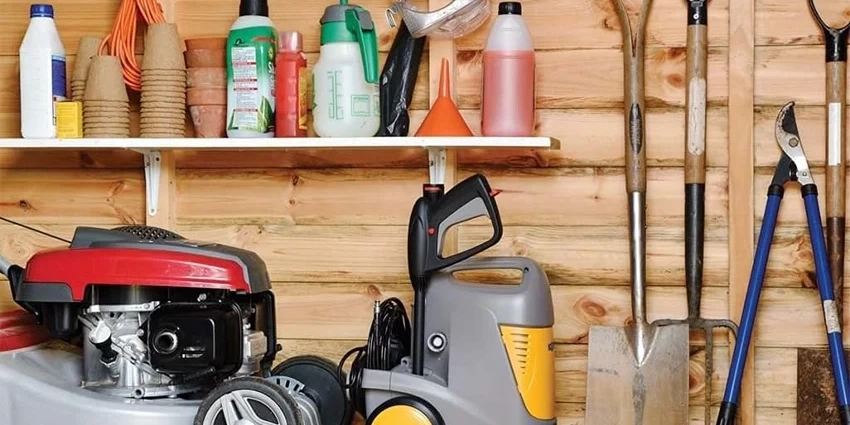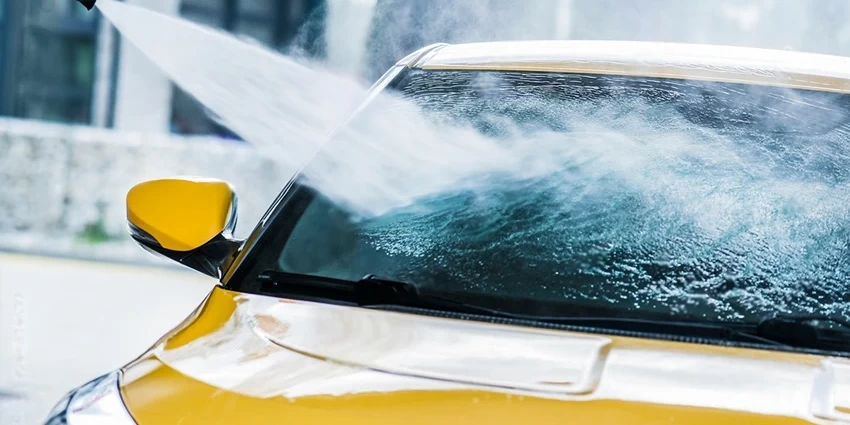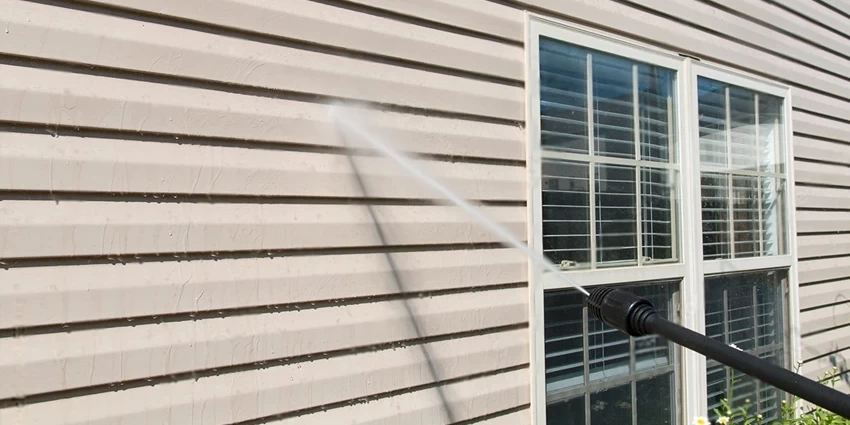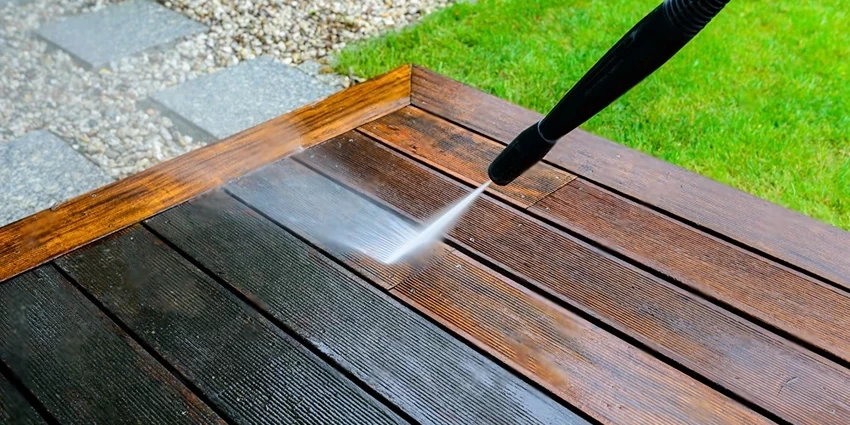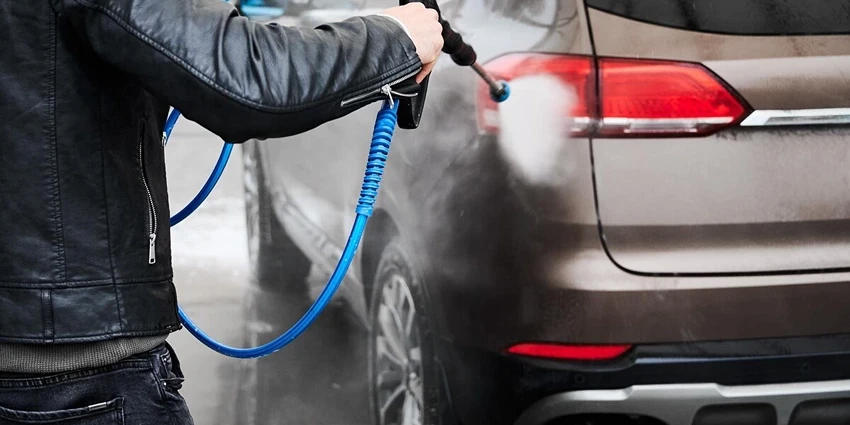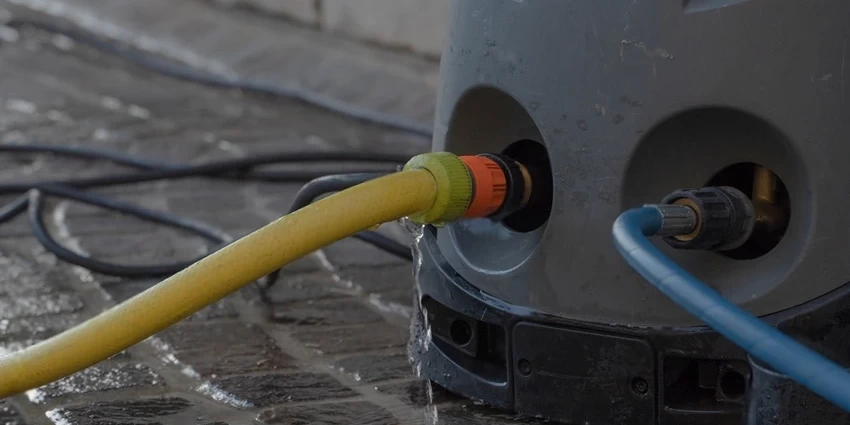All products were chosen independently by our editorial team. This review contains affiliate links and we may receive a commission for purchases made. Please read our affiliates FAQ page to find out more.
Home » Pressure Washing » Pressure Washer Chemical Use in Washing
When diving into the world of pressure washing, the use of chemicals often comes up as a topic of both interest and concern. The right chemicals can significantly boost the effectiveness of your cleaning, making daunting tasks much simpler. However, with a plethora of options available, selecting the right one can feel overwhelming. This article aims to demystify pressure washer chemicals, focusing on their types, purposes, and safe usage, particularly within the UK context.
Key Takeaways
- Understanding the different types of pressure washer chemicals is crucial for effective cleaning.
- Selecting the right chemical depends on the surface material, type of dirt, and environmental considerations.
- Safety and legal requirements in the UK guide the use of chemicals in pressure washing to ensure user and environmental protection.
Understanding Pressure Washer Chemicals
Pressure washer chemicals are not just about making things “cleaner”; they’re about enhancing the cleaning power of your pressure washer, allowing you to tackle a variety of tasks more effectively and efficiently. Whether it’s removing stubborn oil stains from your driveway or getting rid of mildew on your patio furniture, the right chemical can make all the difference.

Purpose of Pressure Washer Chemicals
The primary purpose of these chemicals is to break down dirt, grease, and other substances at a molecular level, making it easier for the high-pressure water to wash them away. This not only ensures a deeper clean but also reduces the time and physical effort required to achieve the desired results.
Types of Pressure Washer Chemicals
Understanding the various types of chemicals available is key to choosing the right one for your cleaning needs. Here’s a breakdown of the most common types:
| Type | Purpose | Common Uses |
| Detergents | General cleaning | Patios, siding, cars |
| Cleaners | Targeted cleaning | Specific stains or materials |
| Sanitisers | Kill bacteria | Outdoor furniture, play equipment |
| Disinfectants | Kill bacteria and viruses | High-touch areas, bathrooms |
Specialty Chemicals for Specific Tasks
Some tasks require specialised chemicals designed for specific surfaces or types of dirt:
- Degreasers: Perfect for removing oil and grease from driveways or garage floors.
- Vehicle Wash: Formulated to clean vehicles without damaging paint or finishes.
- Wood Restoration: Designed to clean and restore wood surfaces without causing dryness or damage.
Practical Guide on Chemical Use in Pressure Washing
Choosing the right chemical is only half the battle; knowing how to use it safely and effectively is equally important.

Selecting the Right Chemicals
The selection process should consider the surface material (e.g., concrete, wood, metal), the type of dirt or stain (e.g., oil, mildew, dirt), and environmental impact (e.g., biodegradability, toxicity). For example, a biodegradable detergent is a good choice for general patio cleaning, while a specialised degreaser may be necessary for oil stains on a driveway.
Safe and Effective Use of Chemicals
Safety should always be a priority when using chemicals with a pressure washer. This includes wearing protective equipment such as goggles and gloves, following the manufacturer’s dilution and application instructions, and being mindful of the surrounding environment to avoid harm to plants or animals.
Maintenance and Legal Requirements in the UK
In the UK, the use of pressure washers and chemicals is governed by several regulations designed to ensure safety and environmental protection. These include the Health and Safety at Work etc. Act 1974 (HSWA), the Provision and Use of Work Equipment Regulations 1998 (PUWER), and the Personal Protective Equipment at Work Regulations 1992 (PPE). Adhering to these regulations is not just about compliance; it’s about ensuring the safety of users and the public.

| Regulation | Key Requirement |
| HSWA | Safe operation of equipment |
| PUWER | Regular maintenance and training |
| PPE | Use of appropriate protective gear |
Importance of Equipment Maintenance
Regular maintenance of your pressure washer, especially when using chemicals, is crucial to ensure its longevity and safety. This includes routine checks and cleaning of the equipment to prevent clogs or damage caused by chemical residues.
Selecting the Right Chemicals
Choosing the right chemical for your pressure-washing project is paramount. The decision should be influenced by the surface you’re cleaning and the type of grime you’re dealing with. For instance, a driveway stained with oil will require a different approach compared to a deck plagued by mildew.
Factors to Consider:
- Surface Material: Different materials react differently to certain chemicals. What’s safe for concrete might harm wood.
- Type of Dirt: Grease, mould, algae, and general dirt each have chemicals formulated to tackle them effectively.
- Environmental Impact: Opt for eco-friendly options when possible to minimise harm to your surroundings.
Recommended Chemicals by Surface Type:
| Surface | Recommended Chemical | Reason |
| Driveways | Degreaser | Targets oil and grease |
| Patios | General-purpose detergent | Versatile cleaning |
| Vehicles | Vehicle wash detergent | Safe on paint |
| Wood | Wood cleaner | Prevents damage |
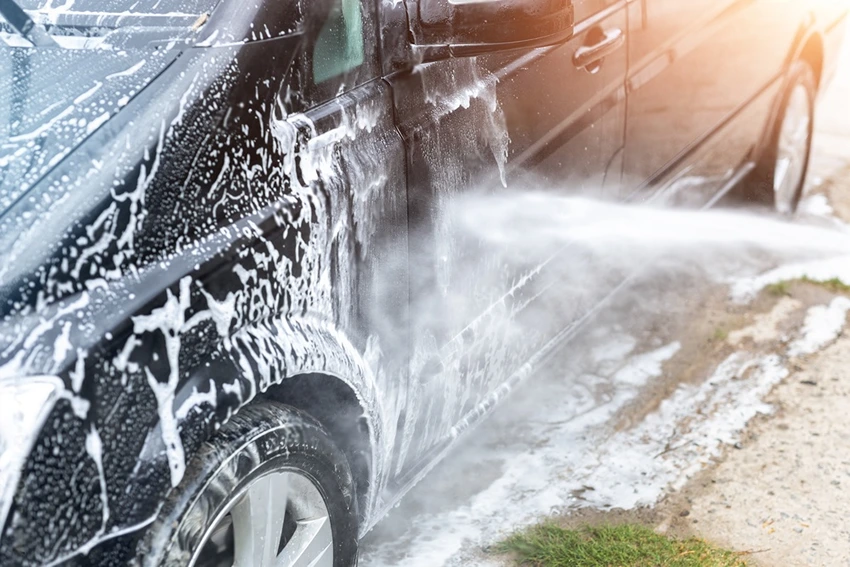
Safe and Effective Use of Chemicals
Safety is crucial when handling chemicals in any context, especially with the added pressure of a washer. Proper dilution, application, and personal protective equipment (PPE) are not just recommendations; they’re necessities.
Safety Measures:
- Dilution and Application: Follow the manufacturer’s instructions in the letter. Incorrect dilution can lead to ineffective cleaning or damage to the surface.
- PPE: At a minimum, wear gloves and goggles. Depending on the chemical, additional protection may be required.
Tips for Maximizing Cleaning Results:
- Pre-treat Stains: For tough stains, apply the chemical and let it sit before washing.
- Test a Small Area: Always test the chemical on a small, inconspicuous area first to ensure it doesn’t cause damage.
Maintenance and Legal Requirements in the UK
Maintaining your equipment and understanding the legal landscape in the UK regarding chemical use in pressure washing ensures both safety and compliance. Regular checks and adherence to regulations protect you, your equipment, and the environment.
Equipment Maintenance Tips:
- Regular Checks: Inspect your pressure washer and accessories for signs of wear or damage before each use.
- Clean After Use: Flush the system with clean water after using any chemical to prevent residue buildup.
UK Legal Requirements Overview:
| Regulation | Purpose | Key Points |
| HSWA | General safety | Ensure safe operation |
| PUWER | Equipment safety | Regular maintenance |
| PPE | Personal safety | Mandatory protective gear |
Register for our latest in-depth reviews and product round-ups from the experts.
Enter your email address below to receive our monthly review emails.
By entering your details, you are agreeing to our terms and conditions and privacy policy. You can unsubscribe at any time.
Frequently Asked Questions
No, it’s important to use detergents specifically designed for pressure washers to avoid damaging your machine or the surface you’re cleaning.
Not all chemicals are safe for every surface. Always check the product label and test on a small area first.
Look for products labelled as biodegradable, non-toxic, or eco-friendly. These are designed to minimise environmental impact.
Mixing chemicals can be dangerous and is not recommended. Use products as directed for safe and effective cleaning.
A passionate plant enthusiast on a mission to turn every space into a blooming haven. With a love for all things botanical, I'm your gardening guide, sharing quick tips, the joy of nurturing plants, and the belief that every day is a great day to garden. Join me in cultivating a thriving garden paradise—we'll sow, grow, and flourish together in this green revolution!



